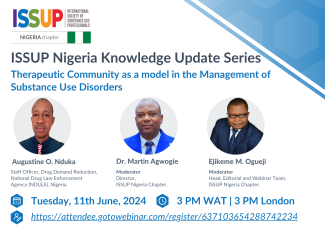Bi-Monthly Webinar: ISSUP Nigeria Knowledge Update Series (22nd Session)

ISSUP Nigeria would like to invite you to the 22nd session of its bi-monthly webinar in the Knowledge Update Series. This webinar will focus on the topic of 'Therapeutic Community as a model in the Management of Substance Use Disorders.'
Time: 3:00 PM WAT | 3:00 PM London
Register for the Webinar
This webinar will discuss the benefits and structure of Therapeutic Communities (TCs) in drug addiction treatment, focusing on adapting the TC model to different cultural contexts, including Nigeria. Key aspects include utilizing the social environment therapeutically, encouraging active patient participation, developing problem-solving skills, and fostering personal responsibility.
Participants will learn about the TC treatment process, including the stages of treatment, therapeutic techniques, and the role of community support. Examples from successful TCs such as San Patrignano in Italy will be highlighted, showcasing their impact on addiction recovery. The session will also feature a Q&A segment to address participants’ questions and concerns.
Target Audience:
- Policymakers, practitioners, managers, members of the public .
Learning Outcomes:
Following this webinar, participants will:
-
Learn about the workings of Recovery Oriented Therapeutic Community model (TC) as part of SUD management.
-
Understand why the TC is a model of choice for addressing the incidence of relapse in SUD management.
-
Learn strategies for adapting TCs models.
-
Suggestions and recommendations for SUD practitioners on TCs.
Presenter:
Mr. Augustine O. Nduka
Mr. Augustine O. Nduka obtained his Bachelor of Science Degree in Biochemistry at Obafemi Awolowo University Ile ife, Osun state, Nigeria and holds an advanced professional diploma in criminology, terrorism and intelligence studies of NAOWA institute of science and technology, Nigeria.
He worked briefly with the Norman Engineering and Construction Company limited and later Synergy Systems Limited, a software support company before enlisting into the National Drug Law Enforcement Agency (NDLEA) in 2001. He has served in different states and in different capacities with the NDLEA including as principal staff officer, drug demand reduction.
He has received several trainings in addiction related fields including, training on management in health and monitoring and evaluation in Global Health from the University of Washington; introduction to Evidence Based Prevention (INEP) Course from first medical University, Charles University Prague Czech Republic; Drug Prevention, Treatment and Care (DPTC) of United Nations Office on Drugs and Crime (UNODC) and Colombo Plan Universal Prevention Curriculum (UPC) trainings.
He is a Universal Treatment Curriculum (UTC) National Trainer in Nigeria, an Internationally Certified Addiction Professional, ICAP 1 of Colombo Plan DAP, a member of ISSUP Nigeria Chapter and ISSUP Global.
Moderators:
Dr. Martin O. Agwogie
Director, ISSUP Nigeria Chapter
Ejikeme M. Ogueji
Head, Editorial and Webinar Team, ISSUP Nigeria Chapter
References:
-
Alexander B K, (2000) The globalization of addiction. Addiction research, 8(6),501-526
-
Alison M, Delvin & Daniel (2020) Mechanisms and context in san pa drug recovery community, Italy. a qualitative study to inform transfer to Scotland. Drugs education prevention and policy.
-
Buchanan, J. (2006) Understanding problem drug use: a medical matter or a social issue. British Journal of Community justice 4(2) 387-397
-
NDUS (2018) Nigeria drug use survey 2018
-
Kennard, D. (2000) An Introduction to Therapeutic Communities, London:
-
Jessica Kingsley Buber, M (1965) Between Man and Man New York: Macmillan
-
Tucker, S (2000) A Therapeutic Community Approach to Care in the Community: Dialogue and Dwelling. London: Jessica Kingsley
Webinars and online events delivered and hosted by the International Society of Substance Use Professionals (ISSUP) are provided for informational purposes only. They are educational in nature and do not constitute medical advice, diagnosis or treatment.
